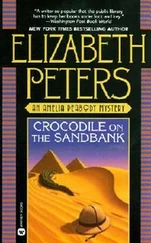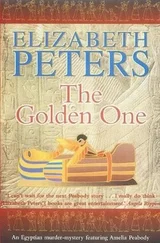“If you have all finished breakfast, we must be on our way,” I said, slipping my arm through that of Emerson before he could explain his notion of good manners to the speaker. I was just in time. The speaker started on another psalm, at an even higher pitch than before.
Nefret had scarcely spoken, except for a murmured “Good morning.” Now she asked, “Where are you and the Professor off to?”
I explained our mission, adding, “We are all going. You will enjoy meeting the gentlemen, I am sure. We will go on foot, enabling you to photograph the sights of the city.”
“Very well. I will just run up and get the camera and my hat.”
“Dear me,” I said. “I seem to have forgotten mine as well. And my parasol.”
“I’ll get them,” Nefret said. “There is no need for both of us to go. May I have the key to your room?”
She gave me a winning smile and met my eyes with a candid gaze that aroused certain suspicions. I am a firm believer in the old adage that says “Never trust a man who looks you straight in the eye.”
Or words to that effect. I couldn’t think what mischief Nefret could get up to in ten minutes, but after David’s defection I was taking no chances. With a winning smile of my own I said I would accompany her, since I hadn’t made up my mind which hat to wear. (The hat I selected was my traveling hat, of fine straw with ribbons that tied under the chin and topped with a tasteful arrangement of dried flowers.) She came out of her room before I could knock at the door, hat and camera in hand. So perhaps the offer had been genuine. Perhaps I was becoming too suspicious.
The men had scattered in all directions, which men are inclined to do when women leave them to their own devices for any length of time. I believe they are easily bored. Selim and Daoud had gone back to the dining room for a last bite, and Emerson was arguing with a bewildered man, whom I deduced to be a Protestant minister. I collected them, to the relief of the clerical gentleman, and then looked round.
“Now where has Mr. Plato got to?”
“Perhaps he is waiting outside,” Selim suggested.
However, he was nowhere to be seen. “Confound the man,” I exclaimed. “He has wandered off. We will never locate him now.”
“The devil with him,” said Emerson, consulting his pocket watch. “He will find his way back, or he won’t. I’ll wager he will turn up when he gets hungry-within an hour or two, at most.”
The British Society for the Exploration of Palestine was housed at that time in a lovely old Arab building in the center of the Old City. It took us a while to get there. None of the persons we asked for directions had ever heard of the place. So we wandered, quite happily on my part, quite otherwise on the part of Emerson, along tortuously winding streets, under ornamented arches, up and down steps as narrow and as steep as staircases. The Babel of tongues, the cries of street vendors, the variety of costumes, the elegance of carved fountains and elaborate doorways-all added to the pleasure of the stroll. But when Emerson’s complaints rose to a thunderous grumble I returned my attention to our errand. Stopping a picturesquely garbed individual towing a goat, I asked where the mosque of Sheikh Abu al Mahmud was to be found. The Society offices, as I had taken pains to ascertain from the clerk at the desk, was nearby.
Following the directions provided by the amiable goatherd, we were soon at our destination.
“We are late,” said Emerson, beating a tattoo on the door with the massive iron knocker. “Why didn’t you ask for the mosque before?”
I never lie unless it is absolutely necessary, so I did not reply. The time elapsed from our leaving the hotel meant that we had arrived at a respectable hour in midmorning, instead of turning up at 8:00 A.M.
From the enthusiastic welcome we received I realized we might have come at almost any hour. The director, Mr. Samuel Page, was a lean individual almost as tall as Emerson, and only half his bulk. His shoulders had the characteristic scholarly stoop, and his hair had vanished except for a thin gray tonsure. His office was a pleasant room lined with bookshelves and carpeted with several fine old oriental rugs. Peering at us through gold-rimmed eyeglasses, he shook hands with everyone except Selim and Daoud, whom he acknowledged with a polite inclination of his head.
“You have brought your own reis and assistant with you, I see. An excellent thought. What other staff have you?”
Settling himself with a thud into the chair Mr. Page had indicated, Emerson replied, “Mrs. Emerson and myself, Miss Forth, and-and…” He cleared his throat loudly and looked to me for help.
“My son and his friend, the artist of our group,” I finished. “They have been delayed but will soon join us.”
“Quite right,” said Emerson, overcoming his moment of weakness.
“Will that be sufficient? I may be able to introduce you to a few qualified persons who are familiar with this region.”
“As a matter of fact,” I began.
“It will be sufficient,” Emerson said loudly. “Our excavations will be limited in time and extent.”
“Then…then dare I hope that your primary intent is otherwise? That you are here in response to the protests we have been sending to our colleagues in England and America regarding a certain-er-”
“Major Morley,” said Emerson.
“Then you are aware of the situation. Thank heaven! All of us here feel helpless to stop him. He has been enthusiastically welcomed by the governor of Jerusalem, Azmi Bey Pasha, and has official permission from Constantinople. Professor Emerson, so far as we can determine, the fellow has absolutely no professional training. No one seems to know who he is, or what he is after, though there are distressing rumors that this is a purely treasure-hunting expedition. We cannot-”
Emerson raised a magisterial hand. “Calm yourself, sir.”
“I do beg your pardon.” Mr. Page took out a handkerchief and mopped a forehead now liberally bedewed with drops of perturbation. “When we heard of your arrival it gave us fresh hope. Your reputation is well known, Professor, not only for professional integrity, but for…er…how shall I put it?”
“Cutting through red tape?” I suggested.
Emerson, who had been expecting a more emphatic metaphor, nodded graciously at me. “What’s he doing now?”
“He has just begun his so-called excavations on the Hill of Ophel.”
“Well, well.” Emerson fondled the cleft in his prominent chin. “By a strange coincidence, my own excavation is nearby.”
“The whole area is surrounded by guards and soldiers. No one has been able to get near it,” Page said.
If Emerson had entertained doubts as to how to proceed, that challenge would have ended them. His sapphirine-blue eyes shone with anticipatory plea sure. “We will see,” he said.
Belatedly remembering his manners, Mr. Page offered us refreshment. Emerson declined with thanks. “I want to inspect the site this afternoon,” he explained.
“We promised to call on Dr. Ward this morning,” I reminded him.
“No time for that, no time for that,” said Emerson. “I presume Page here is speaking for the entire archaeological community of Jerusalem. Reassure your associates, sir. Mrs. Emerson and I are on the job.”
WE RETURNED TO THE HOTEL for luncheon. Emerson considered this a frightful waste of time and said so, at length. I had got him to agree by pointing out that Nefret and I were not dressed for scrambling up and down the hills of Jerusalem. I was also anxious to know whether Mr. Plato had returned. He was becoming an infernal nuisance, but we had assumed responsibility for him and I do not abandon responsibilities lightly.
Читать дальше








